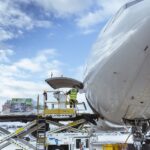Emirates has become the world’s first airline to operate an A380 demonstration flight using 100% sustainable aviation fuel (SAF).
The flight took off from Dubai International Airport (DXB) with one of four engines powered on 100% SAF, helping demonstrate its potential as a drop-in replacement.
SAF can reduce carbon emissions by up to 85% over the fuel’s life cycle when compared to conventional jet fuel.
The emissions from the combustion of drop-in SAF are comparable to fossil-based jet fuels, so the majority of the reductions in emissions are from the production process.
Demonstration flights pave the way for future standardisation, qualification and adoption for 100% SAF flying, as governments adopt broader strategies to support the production and scale up of SAF.
The Emirates A380 demonstration flight comes as the aviation industry, international organisations, regulatory bodies and high-level officials driving policy-related decisions converge in Dubai for the Third International Civil Aviation Organisation (ICAO) Conference on Aviation and Alternative Fuels (CAAF/3).
The 100% drop-in SAF used on the Emirates flight includes renewable aromatics and closely mimics the characteristics of conventional jet fuel. This is the first time that drop-in
SAF has been used on an A380 aircraft, with the expectation of full compatibility across the aircraft’s existing systems. The flight carried four tonnes of SAF, comprised of HEFA-SPK provided by Neste (hydro processed esters and fatty acids synthetic paraffinic kerosene) and HDO-SAK from Virent (hydro deoxygenated synthetic aromatic kerosene).
ENOC helped to secure the neat SAF comprised of HEFA-SPK, and blended it with Sustainable Aviation Kerosene (SAK) at its facility in Dubai International Airport ahead of the demonstration, and also carried out into-plane services.
A380 demo
The 100% SAF was used in one Engine Alliance GP7200 engine, while conventional jet fuel was used in the other three engines. The PW980 auxiliary power unit (APU) from Pratt & Whitney Canada also ran on 100% SAF.
Last week, robust engine testing for one A380 Engine Alliance GP7200 engine using 100% SAF was carried out, with the objective of validating the engine’s capability to run on the specially blended 100% drop-in SAF without affecting its performance or requiring any modifications. Ground engine testing took place at the state-of-the-art Emirates Engineering Centre in Dubai.
Adel Al Redha, COO, Emirates Airline, said: “Emirates is the first passenger airline in the world to operate an A380 with 100% drop-in SAF powering one of four Engine Alliance GP7200 engines. This is another proud moment for Emirates and our partners, as we put words into action with the research into and the trialling of higher concentrations of SAF to eventually lead to industry adoption of 100% SAF flying.
“This marks another significant step in validating the use of SAF in one of the engines of the A380, a wide-body aircraft with four engines. The growing global demand for lower-emission jet fuel alternatives is there, and the work of producers and suppliers to commercialise SAF and make it available will be critical in the coming years to help Emirates and the wider industry advance our path to lower carbon emissions.”
Julie Kitcher, Airbus EVP communications and corporate affairs, said: “Seeing Emirates flying an A380, the world’s largest airliner, powered by an engine running on 100% Sustainable Aviation Fuels is a symbolic moment. These fuels are the most effective way to address CO2 emissions in the aviation industry today and that they are supported increasingly by the world’s leading airlines.
“SAF is vital to meeting the sector’s target of net-zero emissions in 2050, but needs the backing of the whole industry. At Airbus, we are working to make all our aircraft 100% SAF-capable by 2030. We’re also working with partners to grow the global SAF market in the coming years. Airbus’s purpose as a company is to pioneer sustainable aerospace for a safe and united world. Through our partnership with Emirates, we’re matching ambition with action.”
Subscribe to the FINN weekly newsletter

